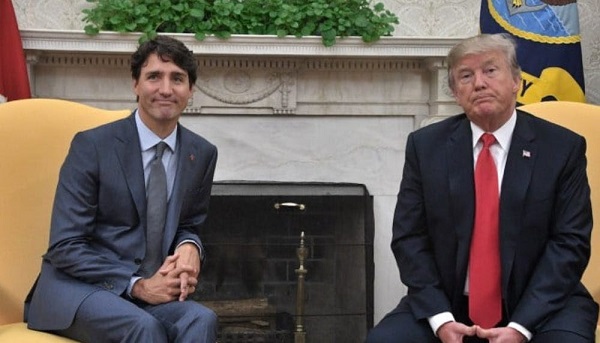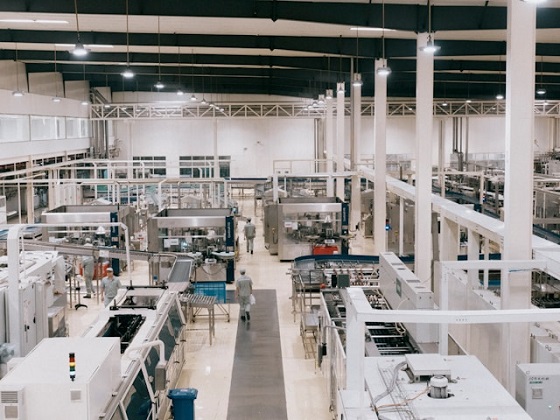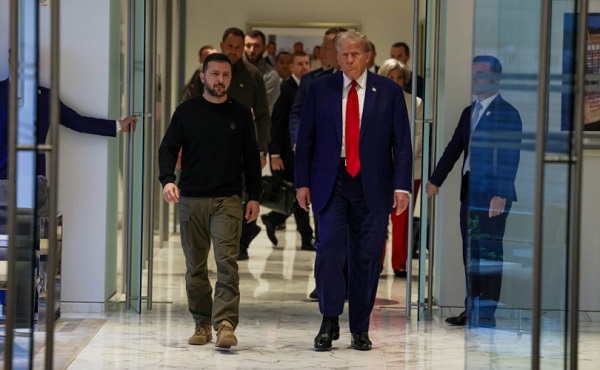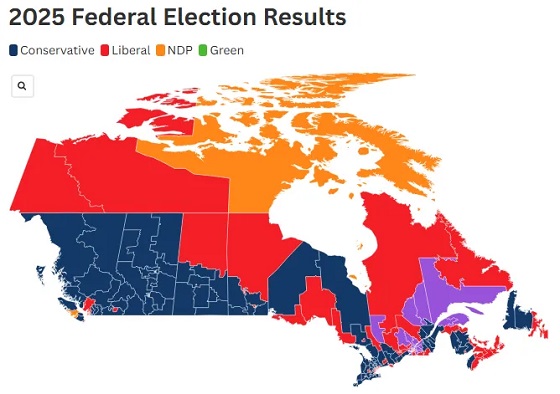Business
Oil may be exempt from Trump Tariffs as Trump says oil “has nothing to do with it”

From LifeSiteNews
Trump to impose 25% tariffs on Canada, Mexico this Saturday
U.S. President Donald Trump has confirmed that he will implement 25% tariffs on all imports from Canada and Mexico this Saturday.
During a January 30 interview, Trump announced that, beginning February 1, he will impose 25% tariffs on all imports from Canada and Mexico while Canada’s Parliament remains suspended thanks to an order by Prime Minister Justin Trudeau.
“Number one is the people that have poured into our country so horribly and so much,” Trump told media. “Number two are the drugs, fentanyl, and everything else that have come into the country; and, number three are the massive subsidies that we’re giving to Canada and to Mexico in the form of deficits.”
It’s unclear if Canada’s oil will be exempt from the tariff as Trump told reporters that oil “has nothing to do with it.”
Trump’s tariffs aim to force Canada and Mexico to take serious action against illegal drug smuggling and immigration which occurs at their borders.
Initially, the tariff was to take effect on his first day of office, January 20, but was postponed until February 1, leaving Canadians under two weeks to respond to his demands.
However, because Trudeau prorogued Parliament until March 24, little action has been taken by Canadian politicians to respond to Trump’s threats.
Trudeau, who is slated to resign once a new Liberal leader is selected, has told Canadians that Liberals are considering all options, including retaliatory tariffs.
“We will not hesitate to act,” Trudeau said at a meeting of the Council on Canada-U.S. Relations on January 17. “We will respond and, I will say it again, everything is on the table.”
Conservative Party leader Pierre Poilievre has demanded that Trudeau immediately reconvene Parliament on an “emergency” basis so Canada can deal with the looming tariffs.
“Canada is facing a critical challenge. On February 1st we are facing the risk of unjustified 25% tariffs by our largest trading partner that would have damaging consequences across our country,” wrote Poilievre in a news release Tuesday.
Meanwhile, polls have revealed that 77 percent of Canadians want an immediate election to deal with the tariff threat.
Ontario Premier Doug Ford has done just that, calling a snap election to take place on February 27. The election, according to Ford, allows him to secure a new “four-year” mandate from Ontario voters to respond to Trump’s tariffs.
News that the tariffs are to take effect also come after Trump has repeatedly suggested that he would like to annex Canada and make the country the “51st state” of America.
While Trump’s comments were initially passed over as a joke or trolling, Trump has persistently referred to Canada as the “51st state” and even threatened to use “economic force” to overtake Canada.
Trump claimed that there is a $200 billion trade deficit between Canada and the U.S. regarding spending on “subsidies” and the fact that the U.S. military is there to also “protect Canada.”
Just last week, Trump told the World Economic Forum (WEF), “We love Canada, but they might be better off as part of the United States.” He made the comments to suggest that Canada, as a way of avoiding the tariffs he is threatening, should just up and join the United States.
Trump’s repeated threats have drawn the ire of many Canadians, who boldly tell the president that Canada will remain its own country. Others have warned that the move to annex Canada would bring about the beginning of a one-world government.
Conservative Party of Canada leader Pierre Poilievre, who is likely to become prime minister in the next election, has had choice words for Trump. He has said Canada will “never” become a U.S. “state.”
“We are a great and independent country,” he continued. “We are the best friend to the U.S. We spent billions of dollars and hundreds of lives helping Americans retaliate against Al-Qaeda’s 9/11 attacks. We supply the U.S. with billions of dollars of high-quality and totally reliable energy well below market prices. We buy hundreds of billions of dollars of American goods.”
Business
China’s economy takes a hit as factories experience sharp decline in orders following Trump tariffs

Quick Hit:
President Trump’s tariffs on Chinese imports are delivering a direct blow to China’s economy, with new data showing factory activity dropping sharply in April. The fallout signals growing pressure on Beijing as it struggles to prop up a slowing economy amid a bruising trade standoff.
Key Details:
- China’s manufacturing index plunged to 49.0 in April — the steepest monthly decline in over a year.
- Orders for Chinese exports hit their lowest point since the Covid-19 pandemic, according to official data.
- U.S. tariffs on Chinese goods have reached 145%, with China retaliating at 125%, intensifying the standoff.
Diving Deeper:
Three weeks into a high-stakes trade war, President Trump’s aggressive tariff strategy is showing early signs of success — at least when it comes to putting economic pressure on America’s chief global rival. A new report from China’s National Bureau of Statistics shows the country’s manufacturing sector suffered its sharpest monthly slowdown in over a year. The cause? A dramatic drop in new export orders from the United States, where tariffs on Chinese-made goods have soared to 145%.
The manufacturing purchasing managers’ index fell to 49.0 in April — a contraction level that underlines just how deeply U.S. tariffs are biting. It’s the first clear sign from China’s own official data that the trade measures imposed by President Trump are starting to weaken the export-reliant Chinese economy. A sub-index measuring new export orders reached its lowest point since the Covid-19 pandemic, and factory employment fell to levels not seen since early 2024.
Despite retaliatory tariffs of 125% on U.S. goods, Beijing appears to be scrambling to shore up its economy. China’s government has unveiled a series of internal stimulus measures to boost consumer spending and stabilize employment. These include pension increases, subsidies, and a new law promising more protection for private businesses — a clear sign that confidence among Chinese entrepreneurs is eroding under Xi Jinping’s increasing centralization of economic power.
President Trump, on the other hand, remains defiant. “China was ripping us off like nobody’s ever ripped us off,” he said Tuesday in an interview, dismissing concerns that his policies would harm American consumers. He predicted Beijing would “eat those tariffs,” a statement that appears more prescient as China’s economic woes grow more apparent.
Still, the impact is not one-sided. Major U.S. companies like UPS and General Motors have warned of job cuts and revised earnings projections, respectively. Consumer confidence has also dipped. Yet the broader strategy from the Trump administration appears to be focused on playing the long game — applying sustained pressure on China to level the playing field for American workers and businesses.
Economists are warning of potential global fallout if the trade dispute lingers. However, Beijing may have more to lose. Analysts at Capital Economics now predict China’s growth will fall well short of its 5% target for the year, citing the strain on exports and weak domestic consumption. Meanwhile, Nomura Securities estimates up to 15.8 million Chinese jobs could be at risk if U.S. exports continue to decline.
Business
Scott Bessent says U.S., Ukraine “ready to sign” rare earths deal

 MxM News
MxM News
Quick Hit:
During Wednesday’s Cabinet meeting, Treasury Secretary Scott Bessent said the U.S. is prepared to move forward with a minerals agreement with Ukraine. President Trump has framed the deal as a way to recover U.S. aid and establish an American presence to deter Russian threats.
Key Details:
-
Bessent confirmed during a Cabinet meeting that the U.S. is “ready to sign this afternoon,” even as Ukrainian officials introduced last-minute changes to the agreement. “We’re sure that they will reconsider that,” he added during the Cabinet discussion.
-
Ukrainian Economy Minister Yulia Svyrydenko was reportedly in Washington on Wednesday to iron out remaining details with American officials.
-
The deal is expected to outline a rare earth mineral partnership between Washington and Kyiv, with Ukrainian Armed Forces Lt. Denis Yaroslavsky calling it a potential turning point: “The minerals deal is the first step. Ukraine should sign it on an equal basis. Russia is afraid of this deal.”
Diving Deeper:
The United States is poised to sign a long-anticipated rare earth minerals agreement with Ukraine, Treasury Secretary Scott Bessent announced during a Cabinet meeting on Wednesday. According to Bessent, Ukrainians introduced “last minute changes” late Tuesday night, complicating the final phase of negotiations. Still, he emphasized the U.S. remains prepared to move forward: “We’re sure that they will reconsider that, and we are ready to sign this afternoon.”
As first reported by Ukrainian media and confirmed by multiple Ukrainian officials, Economy Minister Yulia Svyrydenko is in Washington this week for the final stages of negotiations. “We are finalizing the last details with our American colleagues,” Ukrainian Prime Minister Denys Shmyhal told Telemarathon.
The deal follows months of complex talks that nearly collapsed earlier this year. In February, President Trump dispatched top officials, including Bessent, to meet with President Volodymyr Zelensky in Ukraine to hammer out terms. According to officials familiar with the matter, Trump grew frustrated when Kyiv initially refused U.S. conditions. Still, the two sides ultimately reached what Bessent described as an “improved” version of the deal by late February.
The effort nearly fell apart again during Zelensky’s February 28th visit to the White House, where a heated Oval Office exchange between the Ukrainian president, Trump, and Vice President JD Vance led to Zelensky being removed from the building and the deal left unsigned.
Despite those setbacks, the deal appears to be back on track. While no public text of the agreement has been released, the framework is expected to center on U.S.-Ukraine cooperation in extracting rare earth minerals—resources vital to modern manufacturing, electronics, and defense technologies.
President Trump has publicly defended the arrangement as a strategic and financial win for the United States. “We want something for our efforts beyond what you would think would be acceptable, and we said, ‘rare earth, they’re very good,’” he said during the Cabinet meeting. “It’s also good for them, because you’ll have an American presence at the site and the American presence will keep a lot of bad actors out of the country—or certainly out of the area where we’re doing the digging.”
Trump has emphasized that the deal would serve as a form of “security guarantee” for Ukraine, providing a stabilizing American footprint amid ongoing Russian aggression. He framed it as a tangible return on the billions in U.S. aid sent to Kyiv since the start of Russia’s 2022 invasion.
-

 2025 Federal Election2 days ago
2025 Federal Election2 days agoIn Defeat, Joe Tay’s Campaign Becomes a Flashpoint for Suspected Voter Intimidation in Canada
-

 Alberta2 days ago
Alberta2 days agoPremier Danielle Smith responds to election of Liberal government
-

 COVID-191 day ago
COVID-191 day agoFreedom Convoy leaders’ sentencing judgment delayed, Crown wants them jailed for two years
-

 Banks1 day ago
Banks1 day agoTD Bank Account Closures Expose Chinese Hybrid Warfare Threat
-

 2025 Federal Election1 day ago
2025 Federal Election1 day agoPost election…the chips fell where they fell
-

 COVID-1923 hours ago
COVID-1923 hours agoCanada’s health department warns COVID vaccine injury payouts to exceed $75 million budget
-

 Duane Rolheiser1 day ago
Duane Rolheiser1 day agoCarney Wins: What now Alberta?
-

 Alberta1 day ago
Alberta1 day agoHours after Liberal election win, Alberta Prosperity Project drumming up interest in referendum





